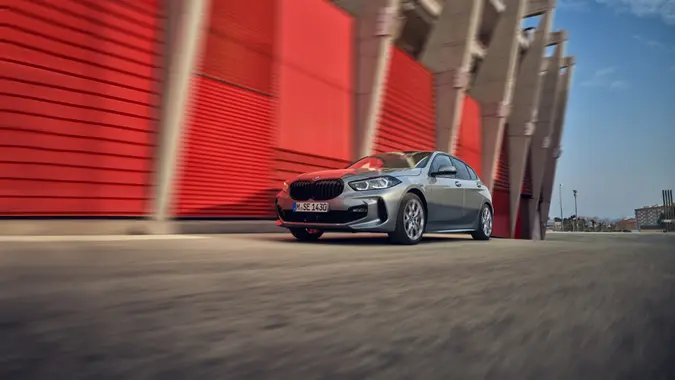How Much Down Payment for a Car? What You Need To Know Before Buying

Commitment to Our Readers
GOBankingRates' editorial team is committed to bringing you unbiased reviews and information. We use data-driven methodologies to evaluate financial products and services - our reviews and ratings are not influenced by advertisers. You can read more about our editorial guidelines and our products and services review methodology.

20 Years
Helping You Live Richer

Reviewed
by Experts

Trusted by
Millions of Readers
If you’re financing a new or used vehicle with a car loan, you have to spend some money upfront. You hear the added costs at the end of car dealer commercials. They typically include taxes, title and vehicle registration.
But there’s another expense associated with buying a car, and it can vary dramatically — the down payment. So, how much down payment for a car should you plan for? The answer depends on whether you’re buying new or used, your credit and your financial goals.
How Much Down Payment for a Car Do You Need?
Experts recommend putting 20% down for a new car purchase, and 10% for a used car, according to Progressive Insurance. While it might take time to save for such a hefty down payment, it can be worth it.
- A larger down payment will lead to lower monthly payments and may even result in a lower interest rate.
- For buyers on the borderline of a good credit score, a larger down payment can mean the difference between getting financing or being denied a car loan.
- Some lenders offer 0% financing, but you’ll pay more in the long run. You’ll pay interest on the total cost of the car and you’ll also have higher monthly payments.
- When you’re trading in an older vehicle, that car has a trade-in value that can be applied to your down payment, too.
3 Factors That Affect Down Payment Amount
Your down payment may be open to negotiation if you seek financing through the dealership. Several factors drive the lender’s decision to accept a smaller down payment.
1. Type of Car — New vs. Used
When you buy a new car, it depreciates by an average of 20% within the first year, according to Kelley Blue Book. This figure can vary, though, based on the vehicle.
Putting at least 20% down means that you’re less likely to owe more than the car is worth a few years into your loan.
A used car is typically cheaper and has already experienced depreciation — up to 60% by year five. You may be able to put down as little as 10%, although requirements may vary based on the lender and your credit score.
2. Loan Terms and Lender Requirements
When you apply for a car loan, lenders look at the loan-to-value ratio. Putting more money down lowers the LTV, which may help you secure a lower interest rate and/or a longer term, which means lower monthly payments.
3. Credit Score Impact
Borrowers with excellent credit may qualify for zero-down financing, but might pay a higher interest rate.
Borrowers with excellent credit and high income may qualify for coveted zero-down, zero-interest financing.
On the other hand, if you have a low credit score, you may qualify for a loan if you can put more money down.
Pros and Cons of a Larger Down Payment
Here’s how making a larger down payment can impact your car loan, both positively and negatively:
| Pros | Cons |
|---|---|
| Lowers your monthly car payments | Requires more cash upfront |
| Reduces total interest paid over the life of the loan | Could delay your purchase if you need more time to save |
| Improves your chances of loan approval | Might strain or reduce your emergency savings |
| Lowers the risk of owing more than the car is worth | Even with a large down payment, depreciation could still outpace your loan |
How To Decide on a Down Payment Amount
When figuring out how much down payment for a car you need, keep these key factors in mind:
- Consider car prices: With the average new car costing around $49,740, a typical down payment could mean coming up with nearly $10,000 — which isn’t realistic for everyone.
- Balance monthly payments and interest rates: A smaller down payment may result in higher monthly payments or higher interest rates, so weigh what you can afford each month.
- Look at your budget: Evaluate how car payments fit into your existing budget. Avoid straining your finances just to make a larger down payment.
- Compare lenders: Shop around with different lenders to see if putting more money down can reduce your interest rates.
How To Save for a Car Down Payment
When you’re ready to start shopping for a new car, give yourself time to save the money you’ll need. Here are some things to keep in mind:
- Set up an automatic savings plan: Consider funneling money from each paycheck into a high-yield savings account automatically.
- Use round-up savings programs: Banks like Bank of America offer programs that round up your purchases and transfer the extra into savings, helping you save faster.
- Trim your budget temporarily: Evaluate your household spending and see where you can cut non-essentials like extra streaming services or frequent dining out.
- Find extra income sources: Look for quick ways to boost savings, such as driving for Uber, working as an Instacart shopper or selling items you don’t need on Facebook Marketplace.
- Leverage trade-ins and dealer incentives: Trading in your current vehicle or taking advantage of cash-back offers can reduce the car’s purchase price, effectively increasing your down payment.
Can You Buy a Car With No Down Payment?
Zero-down financing deals may be harder to find in a tight lending environment. But buyers with strong credit and high income can sometimes find them for new cars. You might pay a higher interest rate. Your monthly payments will also be higher unless you can extend the loan’s term.
Good To Know
Financing the entire cost of a car could leave you “underwater” on your loan — owing more than the car is worth.
To protect yourself, consider gap insurance, which can cover the difference if the car is totaled.
Also, if you decide to sell or trade in the car later, you may have to pay out-of-pocket if its value doesn’t fully cover your remaining loan balance.
Final Thoughts — How Much Should You Put Down?
Ideally, you’ll step onto the car lot with 20% available for the purchase of a new car or 10% for a used vehicle. But if putting that much down would deplete your emergency savings, you might consider other options.
If you have a good credit score and can find the loan terms you want by putting down 5% or less, that might work for your budget. Keep in mind that long-term costs could be higher if you put less money down.
FAQ
Here are the answers to some of the most frequently asked questions about car down payments.- Is 0% down a good idea for a car?
- Some dealers offer 0% down financing for new vehicles. But it may not be a good idea, since these offers may come with higher interest rates. You also risk owing more than the vehicle is worth within the first few years if you put less than 20% down.
- What's the minimum car down payment required for bad credit?
- Down payments on cars vary by lender, but many will require 10% down for a used vehicle if the borrower has bad credit.
- Does a bigger down payment lower my interest rate?
- A bigger down payment on a new or used vehicle could lead to a lower interest rate.
- Can I use my trade-in as a down payment?
- You can trade in a used vehicle and apply the value to the down payment on your new car.
- Should I finance my down payment or save up first?
- If you have the time, saving money for a larger down payment on a new or used vehicle is a better choice, since it can reduce the long-term costs. With a down payment of 10% to 20%, you might secure a lower interest rate or better loan terms.
Our in-house research team and on-site financial experts work together to create content that’s accurate, impartial, and up to date. We fact-check every single statistic, quote and fact using trusted primary resources to make sure the information we provide is correct. You can learn more about GOBankingRates’ processes and standards in our editorial policy.
- Kelley Blue Book. 2024. "How To Beat Car Depreciation."
- Progressive. "How much should you put down on a car?"
- Kelley Blue Book. 2025. "Average New Car Price Flirting With Record."
 Written by
Written by  Edited by
Edited by 

























